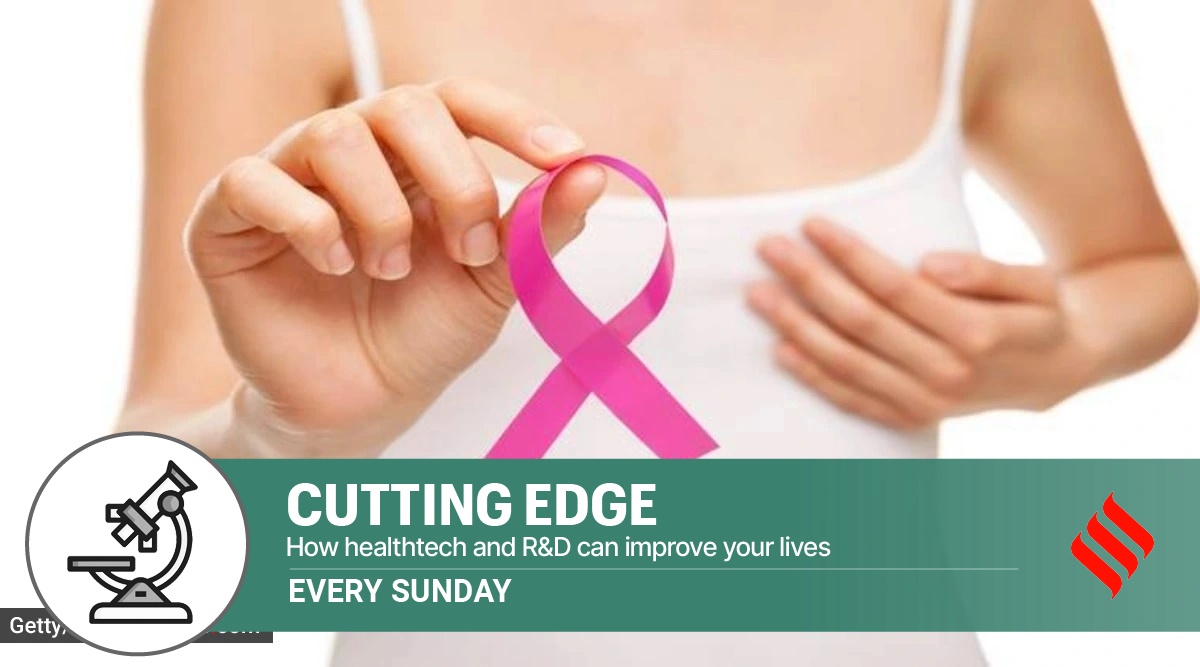
If breast cancer patients had a simple tool to tell them if they needed chemotherapy or not, it would help them save money and time. A UK-based Indian origin scientist, Dr Hemmel Amrania, and his team have made their lives a little easier with their latest invention. It’s a rapid screening system designed to prevent breast cancer patients from undergoing unnecessary chemotherapy.
The tech-aided detection kit has been developed by a medical firm called Digistain at London’s Imperial College and Cancer Research Centre under the guidance of pathologists and with inputs from around 1,500 oncologists. It has been successfully trialled at Nottingham University Hospital and London’s Charing Cross Hospital. In India, the Apollo group is testing it for wider use.
According to Dr Hemmel Amrania, a clinical scientist specialising in pathology, researcher at Imperial College, London, and a founder at Y Combinator, the current methods of testing are slow and expensive. “Our technology is quicker, cheaper and has more than 95 per cent accuracy. Its speed means less reliance on chemotherapy, delivering results in hours and days rather than weeks, thereby saving health providers over 30 per cent on their budgets. The current mechanism to detect the requirement of chemotherapy in cancer patients takes around a month’s time, is expensive and can cost around Rs 3-4 lakh,” says he.
“The majority of cancers are diagnosed using excised biopsy specimens. These are graded, using a gold-standard histopathology protocol based on hematoxylin and eosin (‘H + E’) chemical staining. However, the grading is done by eye and if the same biopsy is graded by different practitioners, they typically only agree 70 per cent of the time. The resulting over-treatment problem constitutes a massive unmet need worldwide,” Dr Amrania adds.
Subscriber Only Stories
His patented technology does not rely on a fixed assessment of chemical analysis but combines a proprietary optical scan with machine learning to identify patterns invisible to fixed algorithmic approaches. This helps capture a unique signature from each biopsy and performs an analysis of over 10,000 data points per sample. With this information, Digistain computes a highly personalised risk score, which has been validated in over 800 patients during a study reviewed by Cancer Research UK.
The new technology uses mid-infrared imaging to map the fractional concentration of nucleic acids, or the nuclear-to-cytoplasmic chemical ratio (NCR), across an unstained biopsy section. It allows a quantitative Digistain index (DI) score, corresponding to the NCR, to be extracted from an objective physical measurement of a cancer. “Our objective here is to evaluate its potential for aiding cancer diagnosis for the first time. We correlate the DI scores with H + E grades in a double-blind clinical pilot trial,” says Dr Amrania, who was recently on a visit to India. The tool will help in detecting cancer, especially that of the breast, as it remains one of the commonest forms of cancer worldwide.
“Recent improvements in treatment regimens have resulted in substantial reductions in mortality but there remains an urgent need to devise more accurate techniques to guide clinicians as to which therapies are needed for specific patients. This is especially true for breast cancer patients with the estrogen receptor (ER) positive form of the disease. This type constitutes nearly 80 per cent of all cases and requires the clinicians to decide whether there is additional benefit from cytotoxic chemotherapy when added to endocrine therapy. In these cases, accurate grading is especially important since often, in node-negative breast cancer, the decision as to whether to administer potentially harmful cytotoxic chemotherapy rests to a great extent on grading,” explains Dr Amrania.
Advertisement
The tool provides an affordable test and has the potential to eliminate the inequality of care protocols in cancer treatment around the world. “Some institutions in India have already adopted the tool, with research funded by the National Institute for Health and Care Research (NIHR) and backed by investment from Harvard University and Y Combinator,” he adds.
Dr Manish Singhal, Senior Consultant, Medical Oncology at Indraprastha Apollo Hospital, Delhi, has used the technology on two of his patients. “It gives the same information about the need for chemotherapy at almost one-fourth the current costs. In India, many patients can hardly set aside Rs 3 lakh for such a screening test,” says he.
However, Dr Singhal adds, that the new invention can help patients who have been detected with early stage breast cancer and only a few women benefit from chemotherapy at this stage. “Now the awareness about cancer has increased and 60 per cent of patients reach the hospital at a very early stage,” he says. Dr Amrania is in talks with government hospitals in India to assess if his tool can help poor patients avail the right kind of cancer treatment.
"breast" - Google News
January 15, 2023 at 09:30AM
https://ift.tt/8jfJrQR
How this AI tool for breast cancer can tell you if you need chemotherapy or not - The Indian Express
"breast" - Google News
https://ift.tt/97C1AtR
https://ift.tt/gm2kcDM
Bagikan Berita Ini














0 Response to "How this AI tool for breast cancer can tell you if you need chemotherapy or not - The Indian Express"
Post a Comment